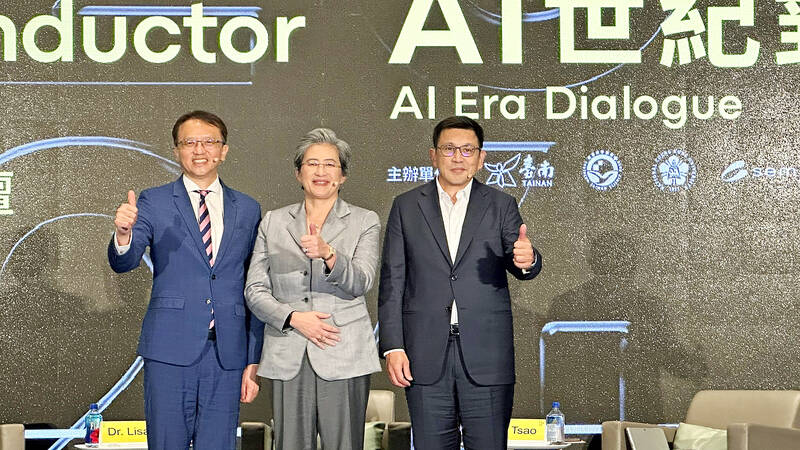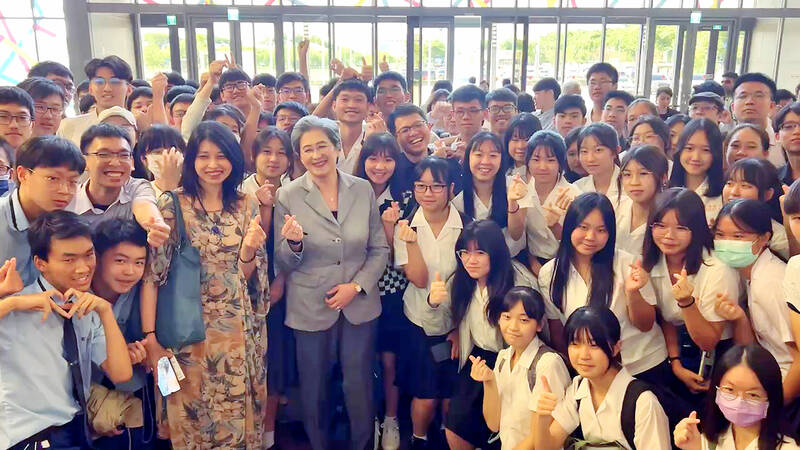Taiwanese supply chain partners such as Taiwan Semiconductor Manufacturing Co (TSMC) would be crucial for US-based Advanced Micro Devices Inc’s (AMD) next-generation technologies, AMD’s Tainan-born chief executive officer Lisa Su (蘇姿丰) said yesterday.
At a forum in Tainan, the AMD chief executive said that she was excited to be making her first trip to the city in a decade, as her hometown celebrates the 400th anniversary of its founding.
Noting “the incredible week” for Taiwan at Computex Taipei, which has seen global technology leaders talk about technology, partnerships and the future, Su jokingly said: “The best is on Friday,” referring to yesterday’s forum.

Photo: Liu Wan-chun, Taipei Times
In the discussion titled “AI Era Dialogue,” Su said artificial intelligence (AI) is “the most important technology that we’ve seen over the past 50 years,” as it has the opportunity to transform every aspect of people’s everyday lives.
She said that AI would also transform the healthcare sector, automotive capability and research capability.
“And Taiwan is a center for computing,” she said.

Photo: Liu Wan-chun, Taipei Times
As AMD is focused on high-performance computing, which requires “making big bets over many, many years,” Su said it is essential to work with those who can build the most advanced technology, many of whom are in Taiwan, such as TSMC, and those in the integrated circuit (IC) design and supply chain.
She cited chip-on-wafer-on-substrate (CoWoS) technology as an example of TSMC’s advancement.
As Moore’s law is slowing down, other ways to continue advancing technology are needed, and one area is in advanced packaging with CoWoS, Su said.
CoWoS is a 2.5D packaging technology launched by TSMC that enables the integration of multiple dies and memory cubes into a single package. It supports the continuation of Moore’s law by allowing more transistors to work together.
Moore’s law is an observation made by Gordon Moore that the number of transistors in an IC doubles roughly every two years.
“Today, our most advanced AI products have more than 150 billion transistors and 12 chiplets that are put together, which is very, very advanced,” Su said.
Taiwan is “so important because it has the supply chain and the ability to bring all these pieces together,” Su added.
The AMD chief executive also quipped that Taiwan is the only place where you can say CoWoS and everybody understands what it is.
Su was joined by Jason Chen (陳俊聖), chairman of Acer Inc and an alumnus of Tainan’s National Cheng Kung University, in the discussion at the Southern Semiconductor Forum.
With several newly planned science parks, Tainan has been described as a potential major player in the next semiconductor boom driven by AI.

NEXT GENERATION: The four plants in the Central Taiwan Science Park, designated Fab 25, would consist of four 1.4-nanometer wafer manufacturing plants, TSMC said Taiwan Semiconductor Manufacturing Co (TSMC, 台積電) plans to begin construction of four new plants later this year, with the aim to officially launch production of 2-nanometer semiconductor wafers by late 2028, Central Taiwan Science Park Bureau director-general Hsu Maw-shin (許茂新) said. Hsu made the announcement at an event on Friday evening celebrating the Central Taiwan Science Park’s 22nd anniversary. The second phase of the park’s expansion would commence with the initial construction of water detention ponds and other structures aimed at soil and water conservation, Hsu said. TSMC has officially leased the land, with the Central Taiwan Science Park having handed over the

The Philippines is working behind the scenes to enhance its defensive cooperation with Taiwan, the Washington Post said in a report published on Monday. “It would be hiding from the obvious to say that Taiwan’s security will not affect us,” Philippine Secretary of National Defense Gilbert Teodoro Jr told the paper in an interview on Thursday last week. Although there has been no formal change to the Philippines’ diplomatic stance on recognizing Taiwan, Manila is increasingly concerned about Chinese encroachment in the South China Sea, the report said. The number of Chinese vessels in the seas around the Philippines, as well as Chinese

AUKUS: The Australian Ambassador to the US said his country is working with the Pentagon and he is confident that submarine issues will be resolved Australian Ambassador to the US Kevin Rudd on Friday said that if Taiwan were to fall to China’s occupation, it would unleash China’s military capacities and capabilities more broadly. He also said his country is working with the Pentagon on the US Department of Defense’s review of the AUKUS submarine project and is confident that all issues raised will be resolved. Rudd, who served as Australian prime minister from 2007 to 2010 and for three months in 2013, made the remarks at the Aspen Security Forum in Colorado and stressed the longstanding US-Australia alliance and his close relationship with the US Undersecretary

‘WORLD WAR III’: Republican Representative Marjorie Taylor Greene said the aid would inflame tensions, but her amendment was rejected 421 votes against six The US House of Representatives on Friday passed the Department of Defense Appropriations Act for fiscal 2026, which includes US$500 million for Taiwan. The bill, which totals US$831.5 billion in discretionary spending, passed in a 221-209 vote. According to the bill, the funds for Taiwan would be administered by the US Defense Security Cooperation Agency and would remain available through Sept. 30, 2027, for the Taiwan Security Cooperation Initiative. The legislation authorizes the US Secretary of Defense, with the agreement of the US Secretary of State, to use the funds to assist Taiwan in procuring defense articles and services, and military training. Republican Representative